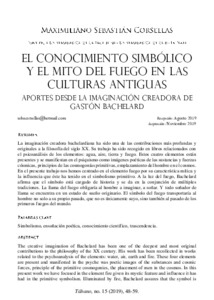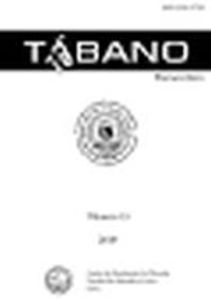Please use this identifier to cite or link to this item:
https://repositorio.uca.edu.ar/handle/123456789/9380| Título: | El conocimiento simbólico y el mito del fuego en las culturas antiguas : aportes desde la imaginación creadora de Gastón Bachelard | Autor: | Corsellas, Maximiliano Sebastian | Palabras clave: | FILOSOFIA; POESIA; CONOCIMIENTO CIENTIFICO; SIMBOLISMO; TRASCENDENCIA; MITOS; Bachelard, Gastón | Fecha de publicación: | 2019 | Editorial: | Universidad Católica Argentina. Facultad de Filosofía y Letras. Centro de Estudiantes de Filosofía | Cita: | Corsellas, M. S. El conocimiento simbólico y el mito del fuego en las culturas antiguas : aportes desde la imaginación creadora de Gastón Bachelard. [en línea]. Tábano. 2019, 15. Disponible en: https://repositorio.uca.edu.ar/handle/123456789/9380 | Resumen: | Resumen: La imaginación creadora bachelardiana ha sido una de las contribuciones más profundas y originales a la filosofía del siglo XX. Su trabajo ha sido recogido en libros relacionados con el psicoanálisis de los elementos: agua, aire, tierra y fuego. Estos cuatro elementos están presentes y se manifiestan en el psiquismo como imágenes poéticas de las sustancias y fuerzas cósmicas, principios de las cosmogonías primitivas, emplazamiento del hombre en el cosmos. En el presente trabajo nos hemos centrado en el elemento fuego por su característica mítica y la influencia que éste ha tenido en el simbolismo primitivo. A la luz del fuego, Bachelard afirma que el símbolo está cargado de historia y se da en la conjunción de múltiples tradiciones. La llama del fuego obligaría al hombre a imaginar, a soñar. Y todo soñador de llama se encuentra en un estado de sueño originario. El símbolo del fuego transportaría al hombre no solo a su propio pasado, que no es únicamente suyo, sino también al pasado de los primeros fuegos del mundo. Abstract: The creative imagination of Bachelard has been one of the deepest and most original contributions to the philosophy of the XX century. His work has been recollected in works related to the psychoanalysis of the elements: water, air, earth and fire. These four elements are present and manifested in the psyche was poetic images of the substances and cosmic forces, principle of the primitive cosmogonies, the placement of men in the cosmos. In this present work we have focused in the element fire given its mystic feature and influence it has had in the primitive symbolism. Illuminated by fire, Bachelard assures that the symbol is charged with history and that it is given in the conjunction of multiple traditions. The flame of the fire would compel man to imagine, to dream. Every dreamer of the flame finds himself in a state of original dream. The symbol of fire would transport man not only to his own past, which is not his own, but also to the past of the first fires of the world. |
Cobertura Temporal: | SIGLO XX | URI: | https://repositorio.uca.edu.ar/handle/123456789/9380 | ISSN: | 1852-7221 2591-572X (on line) |
Disciplina: | FILOSOFIA | DOI: | https://doi.org/10.46553/tab.15.2019.p48-59 | Derechos: | Acceso abierto | Fuente: | Tábano, 15, 2019 |
| Appears in Collections: | TAB - 2019 nro. 15 TAB - 2019 nro. 15 |
Files in This Item:
| File | Description | Size | Format | |
|---|---|---|---|---|
| conocimiento-simbolico-mito-fuego.pdf | 293,18 kB | Adobe PDF |  View/Open | |
| tabano15.jpg | 2,57 kB | JPEG |  View/Open |
Page view(s)
1,052
checked on Apr 30, 2024
Download(s)
37,300
checked on Apr 30, 2024
Google ScholarTM
Check
Altmetric
Altmetric
This item is licensed under a Creative Commons License

